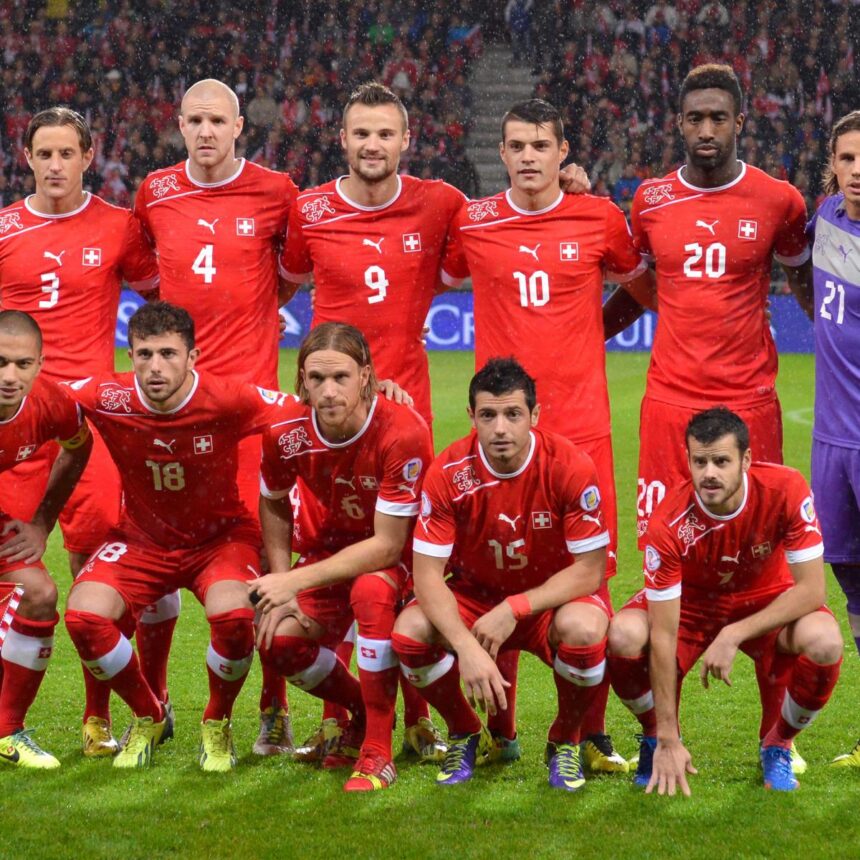Introduction to Switzerland’s Soccer Legacy
Switzerland, a country known for its breathtaking landscapes and impeccable timekeeping, may not be the first nation that comes to mind when you think of soccer powerhouses. However, in recent years, Switzerland has established itself as a force to reckon with in the FIFA World Cup. With skilled players, innovative tactics, and an unwavering commitment to excellence on the pitch, Switzerland’s soccer legacy is one that deserves recognition. In this blog post, we will take a closer look at how Switzerland rose through the ranks of international football and explore the key factors behind their success. So, grab your favorite jersey and get ready to delve into the captivating world of Swiss soccer!
A Brief History of Soccer in Switzerland
Soccer, or football as it is known in most parts of the world, has a long and storied history in Switzerland. The game first arrived on Swiss shores in the late 19th century when British expatriates introduced it to their Swiss counterparts. Initially, soccer was primarily played by amateurs and was considered more of a recreational activity than a serious sport.
However, over time, the popularity of soccer grew steadily among the Swiss population. Local clubs were formed, and regional competitions became commonplace. In 1895, the Swiss Football Association (SFV) was established to govern and organize football activities in the country.
In the early years, Swiss football struggled to make its mark on the international stage. The national team made its debut in 1905 but faced several challenges that hindered their progress. Nevertheless, they continued to participate in various international tournaments with limited success.
It wasn’t until after World War II that Switzerland began to emerge as a competitive force in international soccer. Under visionary coaches like Karl Rappan and Roy Hodgson (yes, that Roy Hodgson), Switzerland experienced an upswing in their performance levels. They qualified for multiple FIFA World Cups during this period and even reached the quarterfinals at home soil when they hosted the tournament back in 1954.
Over time, Switzerland’s national team developed a reputation for being well-organized defensively while also possessing creative attacking options. This balanced approach helped them achieve consistent results against formidable opponents.
Switzerland’s success can be attributed not only to talented players, but also innovative coaching strategies employed throughout their history. From Rappan’s “verrou” defensive system to Vladimir Petkovic’s emphasis on possession-based play today; each coach has left their mark on how Switzerland approaches matches tactically.
Despite these achievements, Switzerland has faced numerous obstacles along their journey at FIFA World Cups.
From fierce competition from traditional powerhouses like Brazil and Germany,
to heartbreaking penalty shootout losses, they have endured their fair share of heartache.
The Rise of the Swiss National Team
Switzerland’s journey in international soccer has been nothing short of impressive. Over the years, they have transformed from underdogs to a formidable force on the global stage. The rise of the Swiss national team can be attributed to their unwavering dedication and strategic approach.
One key factor that contributed to Switzerland’s ascent was their investment in youth development. The country boasts an extensive grassroots program that identifies and nurtures young talent from an early age. This emphasis on grooming future stars has paid off handsomely, as evidenced by their strong pool of skilled players.
Another crucial aspect is the appointment of talented coaches who understand how to maximize the potential of each player and implement effective strategies. These coaches have instilled discipline, tactical awareness, and a winning mentality within the team.
Switzerland’s success can also be attributed to their adaptive style of play. They possess a solid defensive foundation coupled with swift counter-attacking abilities. This combination allows them to exploit opponents’ weaknesses while remaining resolute at the back.
However, it hasn’t always been smooth sailing for Switzerland on their quest for World Cup glory. Like any other team, they have faced challenges along the way – tough group draws, injuries to key players, or moments where luck simply did not favor them. Nevertheless, they have shown resilience and determination when faced with adversity.
The impact of Switzerland’s success extends beyond just soccer achievements; it permeates into various aspects of Swiss culture and economy too. Their strong performances generate nationwide pride among fans who come together in support during major tournaments like the FIFA World Cup. Additionally, increased interest in football leads to economic benefits through tourism revenue and sponsorships.
Looking ahead, Switzerland undoubtedly holds great promise for future World Cups. With a solid foundation built over time and continuous efforts towards improvement, there is no doubt that they will continue making waves on football’s grandest stage.
Key Players and Coaches in Switzerland’s Success
Switzerland’s rise as a force to reckon with in the FIFA World Cup can be attributed to the contributions of key players and coaches who have played pivotal roles in shaping the team’s success. Over the years, Switzerland has produced talented individuals who have showcased their skills on the international stage.
One such player is Xherdan Shaqiri, whose creativity and flair on the field have been instrumental for Switzerland. With his lightning-fast dribbling skills and accurate shooting, Shaqiri has consistently delivered match-winning performances. Another standout player is Granit Xhaka, known for his strong defensive capabilities and precise passing ability.
In addition to these individual talents, credit must also be given to Swiss coaches who have implemented effective strategies that suit the team’s strengths. Former coach Ottmar Hitzfeld was renowned for his tactical astuteness and ability to motivate players. Under his guidance, Switzerland achieved notable victories against formidable opponents.
The current head coach Vladimir Petković has continued this legacy of success by instilling a sense of discipline and teamwork within the squad. His emphasis on cohesive playstyle has allowed Swiss players to seamlessly transition between defense and attack.
It is important to acknowledge that the success of any team cannot solely be attributed to individual brilliance or coaching tactics but rather a collective effort from all involved parties. The combination of exceptional talent at both player and coaching levels has undoubtedly propelled Switzerland towards achieving remarkable results in recent FIFA World Cups.
As we look forward to future tournaments, it will be fascinating to see how new generations of players step up while carrying forward this rich soccer legacy established by their predecessors.
Strategies and Tactics Used by the Swiss Team
When it comes to strategies and tactics, the Swiss team has shown great versatility on the field. One of their key strengths is their disciplined defensive approach. They prioritize maintaining a strong defensive shape, making it difficult for opponents to break through their lines.
The Swiss also excel in counter-attacking football. With quick and agile players who can swiftly transition from defense to offense, they catch their opponents off guard with fast-paced attacks. This tactic allows them to exploit gaps in the opposing team’s defense and create scoring opportunities.
In addition, Switzerland emphasizes ball possession as a crucial aspect of their game plan. By controlling the tempo of the match and dominating possession, they dictate play and force their opponents to react defensively.
Another tactical element that sets Switzerland apart is their focus on teamwork and cohesion. The players demonstrate excellent communication skills on the pitch, seamlessly linking passes and moving together as a unit. This collective effort creates space for attacking opportunities while minimizing defensive vulnerabilities.
Furthermore, Switzerland utilizes set pieces effectively. Their precision in executing free kicks, corners, and penalties adds an extra dimension to their attacking prowess.
These strategic approaches have been instrumental in Switzerland’s success at international tournaments like the FIFA World Cup.
Challenges and Obstacles Faced by Switzerland in the World Cup
Switzerland may have emerged as a force to reckon with in the FIFA World Cup, but their journey has not been without its fair share of challenges and obstacles. One major hurdle that the Swiss team has faced is the intense competition from other powerhouse nations. The World Cup showcases some of the best teams in the world, making it a tough battle for Switzerland to stand out.
Another challenge that Switzerland has encountered is their lack of consistent success in past tournaments. While they have had moments of brilliance, they have also experienced disappointments and early exits. Building a winning mentality and overcoming this inconsistency has been a significant obstacle for the Swiss team.
Furthermore, injuries to key players have posed challenges for Switzerland on multiple occasions. Injuries can disrupt team dynamics and force coaches to make last-minute changes to their strategies. Overcoming these setbacks requires adaptability and depth within the squad.
Additionally, facing strong opponents with different playing styles can be challenging for any team. Each match presents unique tactical demands that must be met with precision and flexibility. The ability to adjust game plans accordingly while maintaining composure under pressure is crucial.
External factors such as travel fatigue, climate variations, and hostile crowds can impact performance during World Cup matches. These elements add an extra layer of difficulty for Switzerland as they strive to maintain focus amidst unfamiliar surroundings.
While these challenges are undoubtedly demanding, they have also served as opportunities for growth and improvement within Swiss soccer. Overcoming adversity builds resilience and fosters innovation in tactics or training methods.
In conclusion (not concluding), navigating through challenges on their path towards becoming a formidable presence at the FIFA World Cup has shaped Switzerland’s soccer legacy into one defined by determination, perseverance, and continuous evolution.
Impact of Switzerland’s Success on the Country’s Culture and Economy
Switzerland’s success in the FIFA World Cup has had a profound impact on both its culture and economy. The nation’s love for soccer has deepened, with fans passionately supporting their national team and local clubs. The sport has become an integral part of Swiss culture, bringing people together to celebrate victories and mourn defeats.
In terms of the economy, Switzerland has seen a significant boost from its soccer success. Hosting international tournaments like the World Cup attracts tourists from all over the globe, boosting tourism revenues. Additionally, successful performances by Swiss players in major leagues around the world have increased their market value and attracted lucrative sponsorship deals.
The success of Switzerland in international soccer competitions has also inspired younger generations to pursue careers in sports. More children are now interested in playing soccer professionally, leading to an increase in investment towards youth development programs across the country. This not only strengthens Switzerland’s talent pool but also contributes to overall physical fitness levels among youngsters.
Moreover, the achievements of Swiss players on a global stage have elevated Switzerland’s reputation as a sporting nation internationally. It showcases their ability to compete at an elite level while upholding values such as fair play and sportsmanship.
Switzerland’s success in the FIFA World Cup has left an indelible mark on both its culture and economy. It unites people through shared passion for soccer while providing economic opportunities through increased tourism revenue and player marketability. Furthermore, it inspires future generations to strive for excellence in sports while promoting positive values associated with athletic competition.
Future Prospects for Switzerland in the FIFA World Cup
As Switzerland continues to make its mark on the international soccer stage, there is a growing sense of optimism about their future prospects in the FIFA World Cup. With each passing tournament, the Swiss team has shown remarkable progress and competitiveness, leaving fans eager to see what lies ahead.
One of the key factors contributing to Switzerland’s positive outlook is their strong pool of talented players. The national team boasts a blend of experienced veterans and promising young talents who have already made significant contributions at both club and international level. This depth in talent bodes well for their chances in future tournaments.
In addition to their player pool, Switzerland’s tactical approach has also been instrumental in their success. Their disciplined defensive style combined with swift counter-attacking tactics has proven effective against even the toughest opponents. This strategic mindset gives them an edge and makes them a challenging opponent for any team they face.
Furthermore, Switzerland’s commitment to developing youth talent through robust training programs ensures a steady supply of skilled players entering the national team setup. The emphasis on nurturing young talents indicates that Swiss football authorities are determined to maintain long-term success rather than relying solely on short-term gains.
Looking ahead, it is clear that Switzerland will remain a force to reckon with in future FIFA World Cups. With continued investment in infrastructure, coaching staffs, and grassroots development programs, there is no doubt that they will continue to improve and compete at the highest level.
While challenges undoubtedly lie ahead – such as tough group stages or facing formidable opponents – Switzerland’s recent performances indicate that they have what it takes to overcome these obstacles and make waves on football’s biggest stage once again.
Conclusion
Switzerland’s soccer legacy is a testament to the passion, dedication, and talent of its players and coaches. Over the years, they have transformed from underdogs to a force to be reckoned with in the FIFA World Cup. The country’s rich history in soccer has shaped its national team into a formidable opponent on the global stage.
Through strategic planning and nurturing young talent, Switzerland has risen through the ranks of international soccer. Their success can be attributed to key players such as Xherdan Shaqiri and Granit Xhaka, who have showcased their skills and made significant contributions to the team’s performance.
Coaches like Vladimir Petkovic have played an instrumental role in shaping Switzerland’s playing style and tactical approach. With their guidance, discipline, and expertise, they have instilled confidence in their players while emphasizing teamwork and unity.
Switzerland has faced numerous challenges along their journey in the World Cup. From tough opponents to injuries that sidelined key players at crucial moments, they have persevered through adversity. Despite these obstacles, they have consistently displayed resilience and determination on the field.
The impact of Switzerland’s success extends beyond just sporting achievements. It has brought immense pride to the nation as fans come together during each tournament to support their team passionately. This collective spirit fosters a sense of unity among Swiss citizens across different regions.
Furthermore, Switzerland’s impressive performances on the world stage have also had positive economic implications for the country. Increased media coverage brings attention not only to Swiss soccer but also promotes tourism and boosts local businesses.
Looking ahead, Switzerland shows great promise for future World Cups. With talented youngsters emerging from youth academies across the country combined with experienced veterans leading by example; there is no doubt that this nation will continue making waves in international football competitions.
Previous Post: Behind the Scenes at Egypt’s FIFA World Cup Campaign: Exploring the Team’s Preparations








